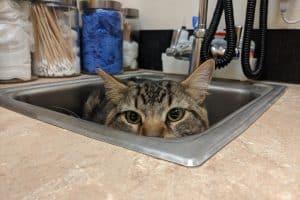Cats are known for their grace, independence, and mysterious nature. But what happens when their health is at risk? One common issue that can affect our feline friends is the development of heart murmurs. Understanding why cats develop heart murmurs can help us better care for our beloved pets and ensure they live long, healthy lives.
As a cat owner, it’s important to be aware of the factors that can contribute to the development of heart murmurs in our furry companions. While heart murmurs can be a cause for concern, they are not always indicative of a serious underlying condition. By learning more about why cats develop heart murmurs, we can be proactive in monitoring our pets’ health and seeking proper treatment when needed.
Genetics and Breed Predisposition
Certain breeds of cats are more prone to developing heart murmurs due to genetic factors. For example, Maine Coons, Sphynx, and Ragdolls are known to have a higher predisposition to heart murmurs compared to other breeds. This genetic predisposition can be traced back through the breed’s lineage, making it crucial for owners of these breeds to be vigilant in monitoring their feline friends’ heart health. Regular veterinary check-ups and screenings can help detect any potential issues early on, allowing for appropriate management and treatment.
Age-Related Changes
As cats age, they may become more susceptible to developing heart murmurs. Just like in humans, the heart undergoes natural wear and tear over time, leading to an increased risk of cardiac issues. Older felines may also be more prone to conditions such as hypertension and hyperthyroidism, which can further contribute to the development of heart murmurs. It is essential for senior cats to receive extra care and regular health evaluations to catch any potential heart problems early and ensure they receive the appropriate treatment and management.
Additional Unique Insight:
Another factor to consider when exploring age-related changes in cats is the impact of lifestyle. Cats that lead sedentary or inactive lifestyles may be at a higher risk of developing heart murmurs as they age. Regular exercise, proper nutrition, and mental stimulation can all play a crucial role in maintaining heart health and overall well-being in aging felines.
Remember, understanding the factors that contribute to the development of heart murmurs in cats can help pet owners take proactive steps to ensure the longevity and quality of life for their beloved companions.
Heart Disease and Health Issues
Heart murmurs in cats can often be a result of underlying heart conditions or other health issues. Conditions such as cardiomyopathy, a common feline heart disease, can lead to abnormal heart sounds. It’s crucial for cat owners to regularly monitor their feline friends’ health and seek veterinary care if any concerning symptoms arise. Additionally, other health issues like hyperthyroidism or hypertension can also contribute to the development of heart murmurs in cats. Ensuring your cat receives regular check-ups and lives a healthy lifestyle can help prevent these issues from arising.
Environmental Factors
Environmental factors play a significant role in the development of heart murmurs in cats. Stress, whether from moving to a new home, the addition of a new pet, or changes in routine, can have a negative impact on a cat’s heart health. It’s essential to create a calm and stable environment for your feline companion to reduce stress levels and promote overall well-being. Furthermore, exposure to toxins such as cigarette smoke, certain plants, or chemicals can also affect a cat’s heart health. Keeping your home free of harmful substances and providing a safe outdoor environment can help prevent the development of heart murmurs in your cat. Remember, a healthy environment leads to a healthy heart!
Additional Unique Insight: Remember, cats are masters at hiding illness, so observing subtle changes in behavior or activity levels can help you catch heart issues early on. Regular veterinary check-ups are key to maintaining your cat’s heart health.
Symptoms and Warning Signs
When it comes to heart murmurs in cats, it’s important to be aware of the symptoms and warning signs that may indicate a problem. If your feline friend is experiencing lethargy, difficulty breathing, coughing, or weakness, it could be a sign of a heart murmur. Keep an eye out for irregular heartbeats or fainting episodes as well. If you notice any of these signs, it’s crucial to seek veterinary attention promptly. Remember, early detection can lead to better outcomes for your beloved cat.
Diagnosis and Treatment Options
Diagnosing a heart murmur in your cat typically involves a physical exam by a veterinarian. Your vet may recommend further tests such as echocardiography or blood tests to confirm the presence of a murmur. Treatment options for heart murmurs in cats vary depending on the underlying cause and severity of the condition. Medications, dietary changes, or lifestyle modifications may be recommended to manage the condition and improve your cat’s quality of life. In some cases, surgical intervention may be necessary for more advanced cases of heart murmurs.
Unique Insight: It’s essential to maintain regular veterinary check-ups for your cat, as heart murmurs can develop gradually and may not always show obvious symptoms. Regular monitoring can help catch any issues early and make a significant difference in your cat’s health. Remember, prevention is key when it comes to managing heart murmurs in cats.
Remember, your cat’s well-being is a top priority, so stay vigilant and proactive in caring for their heart health.
Preventative Measures
Keeping your furry friend healthy and happy is key to preventing heart murmurs in cats. Regular, balanced meals and adequate exercise play a vital role. Scheduling routine check-ups with your veterinarian can catch any issues early on. Remember, a healthy cat is a happy cat!
Interesting Fact: Cat Breeds with Higher Risk
Did you know that maine coon cats and persians are more prone to developing heart murmurs compared to other breeds? While genetics play a role, maintaining a healthy lifestyle can still make a significant difference. Extra care for these breeds can help keep their hearts strong and purring.
Myth Busting: Common Misconceptions about Heart Murmurs
Let’s clear the air on some common myths about heart murmurs in cats. First off, not all heart murmurs mean your furry friend is in immediate danger. Some murmurs are innocent and don’t require treatment. So don’t panic at the first sign of a murmur!
Contrary to popular belief, heart murmurs in cats are not always caused by old age. While age can be a factor, murmurs can develop in cats of any age, even kittens. It’s essential to monitor your cat’s heart health no matter their age.
Another misconception is that heart murmurs are always a serious issue. In reality, some murmurs are benign and might not impact your cat’s quality of life. However, it’s crucial to consult with your vet to determine the underlying cause of the murmur and the best course of action.
Despite what some may think, heart murmurs are not always a death sentence for cats. With proper management and care, many cats with heart murmurs can live happy and fulfilling lives. By working closely with your veterinarian, you can develop a plan to keep your feline friend healthy and comfortable.
Remember, it’s essential to separate fact from fiction when it comes to heart murmurs in cats. Stay informed, consult your vet, and provide the best care for your furry companion. Your cat’s health is worth it!
Understanding the Link Between Dental Disease and Heart Murmurs
Did you know that there is a connection between dental disease and heart murmurs in cats? Poor dental health can lead to bacteria entering the bloodstream, causing infections that can affect the heart.
To prevent dental disease-related heart murmurs, ensure regular dental care for your cat. Brushing their teeth, providing dental treats, and scheduling professional cleanings can help maintain oral health and reduce the risk of heart complications.
Moreover, keeping your cat’s teeth clean not only promotes overall health but also supports heart health. By staying on top of your cat’s dental hygiene, you can lower the chances of dental issues contributing to heart murmurs.
Remember, a healthy mouth leads to a healthy heart. Take care of your cat’s teeth to safeguard their well-being and reduce the risk of heart murmurs associated with dental disease. Your feline friend’s heart will thank you!
Alex, a passionate animal lover, has experience in training and understanding animal behavior. As a proud pet parent to two dogs and three cats, he founded AnimalReport.net to share insights from animal experts and expand his knowledge of the animal kingdom.




